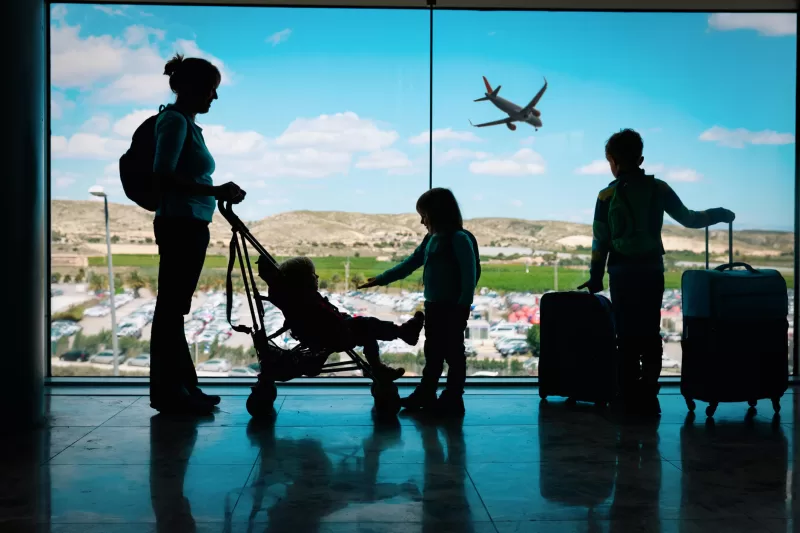Moving abroad has always been wrapped in a certain romance. The idea of uprooting one’s life to settle in a place where the sun is warmer, the streets wind differently, and the future feels uncharted has drawn countless families across borders. For adults, the dream can be intoxicating—a new job, a bigger home, a fresh start. But beneath the postcard images and the promise of adventure lies a less discussed reality: for some children, the shift to a foreign country is not an exciting adventure but a disorienting rupture.
Psychologists call it Expat Child Syndrome—a cluster of emotional, social, and developmental challenges that can arise when children relocate to a country vastly different from their own. It’s a condition rarely named in relocation guides and glossy lifestyle features, yet for many families it becomes the quiet undertow beneath the move, reshaping not just the child’s adjustment but the entire family dynamic.
This is the side of the story rarely captured in relocation guides or glossy lifestyle features—a quiet undercurrent that can shape not only a child’s experience abroad, but the very fabric of family life.
Shadows of a Move
For parents, an international relocation often begins with a burst of optimism. The thought of their child becoming “global”—fluent in new languages, exposed to new cultures, and adaptable in ways that will serve them for life—is enticing. The first weeks may even support that vision: new friends, novelty in daily routines, the thrill of unfamiliar foods and sights. But as the months pass, the adrenaline of change fades, and the deeper work of adaptation begins.
For some children, this is when the cracks start to show. They may withdraw from social activities, lose interest in school, or express frustration that seems disproportionate to the circumstances. What they are experiencing, often without the language to articulate it, is the loss of their familiar world—friends, routines, cultural cues—and the challenge of rebuilding identity in a place where they may feel perpetually on the outside.
Read more like this: How to Move Abroad with Kids
Unlike adults, children often lack control over the decision to move. They have fewer coping tools and less perspective on the long-term benefits. Instead, the here and now dominates, and if the “now” feels alien, isolating, or even hostile, the emotional cost can be steep.
Roots in Shifting Sand
While expatriation might feel like a modern phenomenon driven by global careers and digital mobility, families have been moving across borders for centuries. Colonial expansion, diplomatic postings, missionary work, and military assignments created generations of what we might now call “third culture kids.”
In the 20th century, especially post–World War II, a boom in multinational corporations and international organisations increased the number of families relocating for professional opportunities. The expat ideal took hold—comfortable housing, international schools, domestic help, and a curated version of life abroad.
Read more like this: Bringing Family Abroad – Helping Kids and Spouses Adjust
But with each wave of mobility came the unspoken reality: children were being asked to repeatedly adapt, sometimes uprooted every few years. Research in the 1990s began to look more closely at the psychological effects of transient childhoods, noting both resilience and vulnerability. While some children thrived, others struggled with rootlessness, difficulty maintaining relationships, and a lingering sense of “belonging everywhere and nowhere.”
Expat Child Syndrome is a contemporary framing of that same tension—an acknowledgment that global living, while enriching, can also leave invisible scars.
The Quiet Displacement
Expat Child Syndrome doesn’t manifest in a single way. For some children, it’s marked by sadness, irritability, or isolation. For others, it appears as rebellion—acting out in school, clashing with parents, or retreating into online worlds where their identity feels intact.
Key emotional impacts include:
- Loss and grief: Saying goodbye to friends, family, and familiar spaces can feel like a bereavement, even if the move is framed as an exciting opportunity.
- Cultural dissonance: Struggling to decode new social norms and cues can erode confidence.
Identity disruption: Without the anchors of their home environment, children may question who they are and where they belong. - Academic stress: Adjusting to a different curriculum or language of instruction can create added pressure.
Psychologists note that children often mirror parental stress. If parents are struggling to adapt, children may pick up on the tension, even if it is unspoken. This creates a feedback loop—child distress amplifies parental anxiety, which in turn deepens the child’s sense of instability.
Read more like this: Moving Guide without Losing Your Mind or Going Broke

What the Experts Say
Dr. Karen M., a child psychologist specialising in cross-cultural adjustment, explains that “Children don’t just move to a new country—they move away from the emotional scaffolding that holds their world together. That’s a profound shift, and without active support, it can impact social development and emotional resilience.”
Educators in international schools echo this concern. Teachers often notice behavioural changes or learning dips in the months following a relocation. They stress that early intervention—through counselling, peer mentoring, and extracurricular engagement—can help children find their footing before feelings of alienation take root.
A 2024 guide on Expat Child Syndrome published by Remitly also emphasises the importance of recognising the signs early. “Dismissed as ‘adjustment issues’ too often, these challenges are real and can affect a child’s long-term wellbeing,” the report notes.
Read more like this: Global Experts Share Valuable Advice on Moving Abroad
Making friends in a new country can be exhilarating or excruciating, depending on the child’s age, personality, and environment. Younger children may adapt more quickly, as play often transcends language barriers, but adolescents can face sharper social divides.
International schools, while designed to ease transitions, can also create a bubble that limits integration with the host culture. Conversely, local schools can immerse a child in the new culture but may magnify the language and social gap.
Social media adds another layer. While it can maintain ties with friends “back home,” it can also deepen feelings of exclusion by keeping children constantly aware of what they are missing.
Beyond the Brochure Promises
Relocation agencies and glossy expat blogs tend to focus on the positives: cultural exposure, personal growth, career opportunities. Rarely do they prepare families for the moments when a child refuses to go to school, when friendships falter, or when tears erupt over a missed birthday back home.
The truth is, no amount of logistical planning—shipping furniture, securing visas, finding housing—can guarantee emotional success. The real work lies in preparing the family emotionally and remaining adaptable long after arrival.

Building Emotional Safety Abroad
- Proactive preparation: Involve children in the decision-making process as much as possible. Share photos, videos, and stories about the new country. Let them express concerns without dismissing them as “nerves.”
- Routine as a stabiliser: Maintaining familiar routines—bedtime rituals, family meals, weekend traditions—provides continuity amid change.
- Language support: Even basic language skills can empower children to navigate their environment and connect with peers.
- Counselling and peer groups: Access to child-focused counselling or expat peer groups can normalise their feelings and offer coping strategies.
- Anchors to home: Small touches—favourite snacks, holiday traditions, regular calls with friends—help bridge the old and the new.
Strategies for Long-Term Resilience
Experts recommend thinking of the move not as a single event but as an ongoing adjustment. Dr. M. advises regular “emotional check-ins” during the first year, noting that the deeper challenges often emerge months after the initial excitement has faded.
Parents can set the tone by modelling adaptability—learning the local language, engaging with neighbours, and approaching the new culture with curiosity. This not only helps them integrate but shows children that exploration is safe, even when the terrain is unfamiliar.
Educators stress the importance of a strong parent–school partnership. When parents and teachers share observations early, they can intervene before problems harden, whether through language tutoring, peer mentoring, or counselling support.
Read more like this: 7 Fears Keeping You from Moving Abroad (and How to Beat Them)
When Home Is Everywhere and Nowhere
For some children, the experience of living abroad becomes a core part of their identity—one they carry into adulthood. They may feel equally at ease in multiple cultures, skilled at adapting, and enriched by a diverse worldview. Others may wrestle with a lingering sense of dislocation, never fully identifying with any single place.
The difference often lies in how the family navigates the emotional terrain. Moves that are planned with the child’s perspective in mind, supported by school and community resources, and reinforced with emotional stability tend to result in more positive outcomes.

A Call for Honest Conversations
Expat Child Syndrome will never appear in the glossy brochures selling a life abroad, but acknowledging its existence does not diminish the value of global living. Rather, it makes that life more sustainable. Families who prepare for the challenges—not just the logistics—are better equipped to give their children the best of both worlds.
The dream of raising globally minded children is a worthy one. But it requires understanding that behind the Instagram-worthy sunsets, there may be quiet moments of loss, confusion, and longing. Address those openly, and the move abroad can be not just an adventure, but a truly shared journey.
For a deeper dive into how Expat Child Syndrome unfolds—and what families can do to support their kids—explore Remitly’s insightful Family Guide to Expat Child Syndrome. It’s a thoughtful companion piece that complements our feature.










